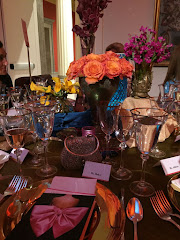When should one respond to an invitation? Who says Grace? What does one bring for a Hostess gift? What should one say to Papa Joe? How should one ask for the pepper? How does one ladle the gravy? These and other answers are listed below:
- DO R.s.v.p. A.S.A.P. R.s.v.p. means "Respondez-vous s'il vous plait", or please respond as soon as you receive your invitation. Put it on your calendar. Hang the invitation up on the fridge in plain sight. Stick to your plan.
- Don't you dare ever show up at some one's home with empty hands. A decent bottle of wine or liquor (not wine in a box), a box of chocolates or cupcakes, homemade cookies or bread, or a danish for breakfast the next morning, a small Christmas Cactus or plant, a bouquet of simple flowers, an antique linen or lace hand towel for the guest bath (can be had at yard sales or estate sales for almost nothing), a wine stopper, or a lovely box of small guest soaps, always work.
- If you receive multiple invitations for parties all for the same day and time, decide which party you would like to attend, and R.s.v.p. to all invitations immediately. Please do not wake up the day of all the parties, decide which party you would like to attend, then call in your declines. Caterers must know a head count many days before the event, and the Hostess will have all ready ruled you out as a "no reply." She will also catch on to what you are up to and you may risk being scratched off the list.
- Thank your Host upon arrival and upon leaving the party. Hosting any function whether it be in a church basement, Condo or grand home is amazingly time consuming, labor intensive, extremely expensive and exhausting. Hosts work for weeks, if not months, on invitations, menu preparations, decorations, and details inside and outside their homes, gardens and yards to get everything perfectly presentable for their guests.
- Leave your cell phone in the car. Period.
- Arrive on time for Dinner Parties and events that involve services.
- Arrive no later than the standard "social half hour " for Cocktail and Christmas parties.
- If you have more than 1 party to attend, work out early departures and late arrivals with each Hostess ahead of time, and quietly enter and exit each party.
- Be a good guest. Offer to hang up coats, put out food, replace food, be the bartender, or introduce new people around.
- Keep all conversation light. Like your Mother told you, do not ever discuss religion or politics.
- Have one dignified, age appropriate "Grace" saying in your head in case you are called upon to say Grace.
- Ask for both the salt and pepper at once and pass both the salt and pepper at once, anticipating the other person's next need. Offer them to the person on your right as a courtesy.
- When the dish starts with you before passing your dish to the left, offer the dish to the person on your right as a courtesy, and you will have an immediate new best friend, especially when your dish is warm bread or rolls!
- Pick up the Gravy Boat and bring the Gravy Boat to your plate, so when you lift the ladle, you will spill the gravy onto your plate, not onto the beautiful tablecloth.
- A good conversation starter is always:" What was your favorite thing you did today?" or "What was your favorite thing at the event today?"
















